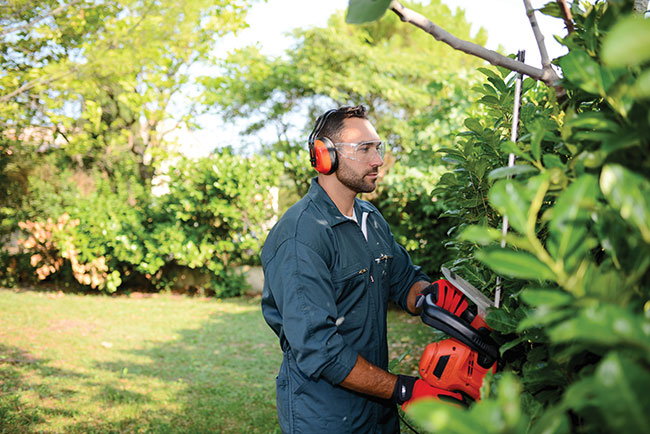
Features
Landscaping
Technology
Get systems in place before growing a landscaping company
KW-area landscaper says a business must be systemized before it should consider growth
December 22, 2023 By Mike Jiggens
 Having good people on staff is the foundation for a successful landscaping business.
Photo credit: W Production / Adobe Stock
Having good people on staff is the foundation for a successful landscaping business.
Photo credit: W Production / Adobe Stock A landscaping business won’t grow without the right systems in place, the owner of a Kitchener-Waterloo-area company says, adding chasing growth without being systemized is a recipe for disaster.
“It’s not all about growth,” Derek Lippert, owner of Quiet Nature Ltd., a predominantly design/build landscaping business in Ayr, Ont., told an audience of landscapers at last winter’s Landscape Congress in Toronto. “You need to be systemized, then grow. Don’t do it the wrong way.”
Having the right people is the foundation for a successful business, he said, but the right processes must first be in place.
Lippert founded his business in 1999. He said the business wasn’t sufficiently systemized at the outset which hindered its success. If a business focuses on profit before caring about its systems, its employees and its customers, its business ethics could become compromised, he added.
Quiet Nature employs about 20 people, specializing in naturalistic landscapes such as ponds and other water features. It does between $3 million and $3.5 million in sales. Some of its specialty work can take crews as far northward as Collingwood.
Lippert said most people don’t purposely seek careers in landscaping, but “stumble” into the profession one way or another. They may have started by mowing lawns during their youth or working for someone else. They found the work paid the bills and inspired them to remain in the industry.
“People are willing to pay you with their hard-earned money to do things for them.”
Lippert said the company owner may then wish to grow his business by taking on more jobs yet finds that although many have gone well, some haven’t. He warned that one bad job could mean the end, putting a company out of business.
At the same time, many of those employed by the business may be considered as ideal workers while some tend to cause grief. Some clients might also be good customers while others “might put you in a corner.”
The business owner might find he needs to grow his company to keep up. He gets more leads and hires more staff but soon finds his people are stressed.
“So, how do we short-circuit this flawed trajectory and move in a more linear path to sanity?”
A business can’t focus solely on the process and the systems without the people, Lippert said, adding a business also can’t only have great people without the processes.
The pillars of a successful business include team and leadership, finance, operations, marketing and sales.
Importance of good people
Getting good people who make a connection and are on the same wavelength will treat their employer well if they’re treated well.
“That’s the foundation for everything. Without that, you don’t have a real business.”
Lippert said that once Quiet Nature became a $500,000 business, it had one returning staff member. A consultant was hired to guide that individual. If one good idea comes from hiring a consultant or a coach, the investment is worth if that idea generates revenue beyond the investment of hiring someone, he said.
“You have to become a slightly better version of yourself every single day.”
When a team sees its employer become more of a well-rounded person who can deal with his own stresses and anxieties that can be shared with the team, it becomes a self-development journey for the business owner, Lippert said.
One A-level employee will help to make a business more successful than several C-level employees, he said, adding the A-level players tend to act as a magnet by bringing B and C-level players forward. The employer himself is no longer the only “magnet.” Others are filling the role.
“The reason other good people are coming and staying is no longer because of you. You want your lead hands to be the quality of employee that any other company around you would put as a crew leader in a heartbeat.”
Lippert suggested companies refrain from hiring new crews until they first have “rock solid, killer people” in the field.
He added that businesses should avoid having a personality monoculture, noting it’s good to have a diversity of opinion and personality among staff. Creative types tend to develop business while conservative types keep businesses running. They need each other, he said.
Lippert encouraged using sub-contractors to outsource things “you’re no good at.”
Landscape contractors should treat recruiting as they do marketing by dedicating a website page that tells prospective employees why they should want to work for that company and why they would fit into the company’s culture.
“When you have good employees who don’t cause drama, be sure to pay them well and listen to what they have to say. It’s easy to overlook the ones who are quiet and steady.”
Weekly or bi-weekly staff meetings keep everyone informed, Lippert said, and are also opportunities to praise, motivate and keep everyone engaged.
Key staff can be taken on company retreats as a means of “tapping into their brains,” he said. “Move out of the environment you’re in and maybe get some ideas flowing.”
Staff retention can be helped when a business provides its employees with the right equipment. If a piece of equipment prevents an employee from doing the work by hand, the worker will experience less strain on his body and will be more apt to stay with the company, Lippert said. Working with the right equipment is also a good marketing tool, he added.
Print this page